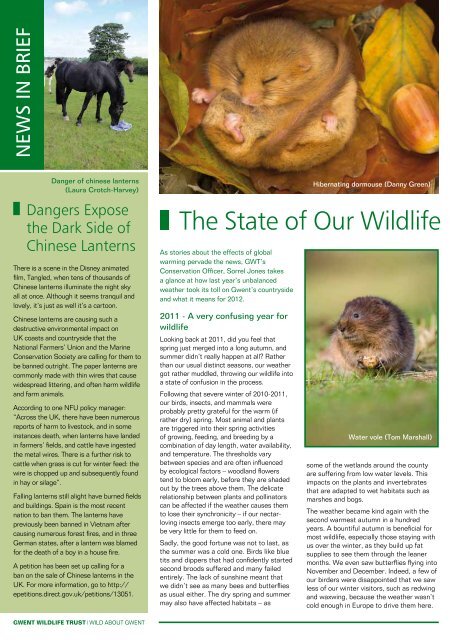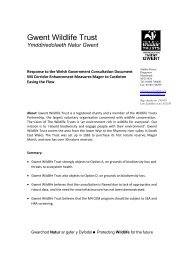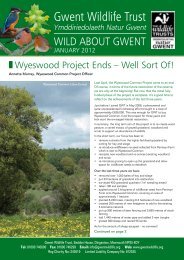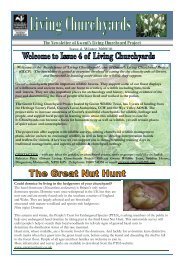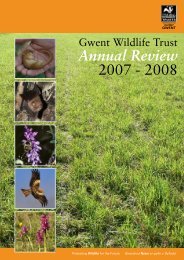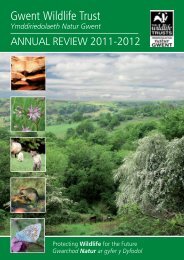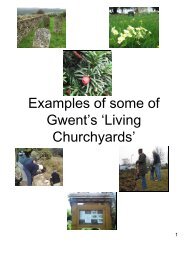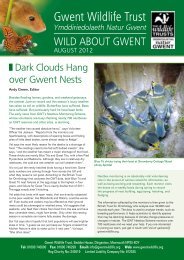Wild About Gwent April 2012.pdf - Gwent Wildlife Trust
Wild About Gwent April 2012.pdf - Gwent Wildlife Trust
Wild About Gwent April 2012.pdf - Gwent Wildlife Trust
Create successful ePaper yourself
Turn your PDF publications into a flip-book with our unique Google optimized e-Paper software.
NEWS IN BRIEF<br />
Danger of chinese lanterns<br />
(Laura Crotch-Harvey)<br />
Dangers Expose<br />
the Dark Side of<br />
Chinese Lanterns<br />
There is a scene in the Disney animated<br />
film, Tangled, when tens of thousands of<br />
Chinese lanterns illuminate the night sky<br />
all at once. Although it seems tranquil and<br />
lovely, it’s just as well it’s a cartoon.<br />
Chinese lanterns are causing such a<br />
destructive environmental impact on<br />
UK coasts and countryside that the<br />
National Farmers’ Union and the Marine<br />
Conservation Society are calling for them to<br />
be banned outright. The paper lanterns are<br />
commonly made with thin wires that cause<br />
widespread littering, and often harm wildlife<br />
and farm animals.<br />
According to one NFU policy manager:<br />
“Across the UK, there have been numerous<br />
reports of harm to livestock, and in some<br />
instances death, when lanterns have landed<br />
in farmers’ fields, and cattle have ingested<br />
the metal wires. There is a further risk to<br />
cattle when grass is cut for winter feed: the<br />
wire is chopped up and subsequently found<br />
in hay or silage”.<br />
Falling lanterns still alight have burned fields<br />
and buildings. Spain is the most recent<br />
nation to ban them. The lanterns have<br />
previously been banned in Vietnam after<br />
causing numerous forest fires, and in three<br />
German states, after a lantern was blamed<br />
for the death of a boy in a house fire.<br />
A petition has been set up calling for a<br />
ban on the sale of Chinese lanterns in the<br />
UK. For more information, go to http://<br />
epetitions.direct.gov.uk/petitions/13051.<br />
As stories about the effects of global<br />
warming pervade the news, GWT’s<br />
Conservation Officer, Sorrel Jones takes<br />
a glance at how last year’s unbalanced<br />
weather took its toll on <strong>Gwent</strong>’s countryside<br />
and what it means for 2012.<br />
2011 - A very confusing year for<br />
wildlife<br />
Looking back at 2011, did you feel that<br />
spring just merged into a long autumn, and<br />
summer didn’t really happen at all? Rather<br />
than our usual distinct seasons, our weather<br />
got rather muddled, throwing our wildlife into<br />
a state of confusion in the process.<br />
Following that severe winter of 2010-2011,<br />
our birds, insects, and mammals were<br />
probably pretty grateful for the warm (if<br />
rather dry) spring. Most animal and plants<br />
are triggered into their spring activities<br />
of growing, feeding, and breeding by a<br />
combination of day length, water availability,<br />
and temperature. The thresholds vary<br />
between species and are often influenced<br />
by ecological factors – woodland flowers<br />
tend to bloom early, before they are shaded<br />
out by the trees above them. The delicate<br />
relationship between plants and pollinators<br />
can be affected if the weather causes them<br />
to lose their synchronicity – if our nectarloving<br />
insects emerge too early, there may<br />
be very little for them to feed on.<br />
Sadly, the good fortune was not to last, as<br />
the summer was a cold one. Birds like blue<br />
tits and dippers that had confidently started<br />
second broods suffered and many failed<br />
entirely. The lack of sunshine meant that<br />
we didn’t see as many bees and butterflies<br />
as usual either. The dry spring and summer<br />
may also have affected habitats – as<br />
Hibernating dormouse (Danny Green)<br />
The State of Our <strong>Wild</strong>life<br />
Water vole (Tom Marshall)<br />
some of the wetlands around the county<br />
are suffering from low water levels. This<br />
impacts on the plants and invertebrates<br />
that are adapted to wet habitats such as<br />
marshes and bogs.<br />
The weather became kind again with the<br />
second warmest autumn in a hundred<br />
years. A bountiful autumn is beneficial for<br />
most wildlife, especially those staying with<br />
us over the winter, as they build up fat<br />
supplies to see them through the leaner<br />
months. We even saw butterflies flying into<br />
November and December. Indeed, a few of<br />
our birders were disappointed that we saw<br />
less of our winter visitors, such as redwing<br />
and waxwing, because the weather wasn’t<br />
cold enough in Europe to drive them here.<br />
GWENT WILDLIFE TRUST x WILD ABOUT GWENT


